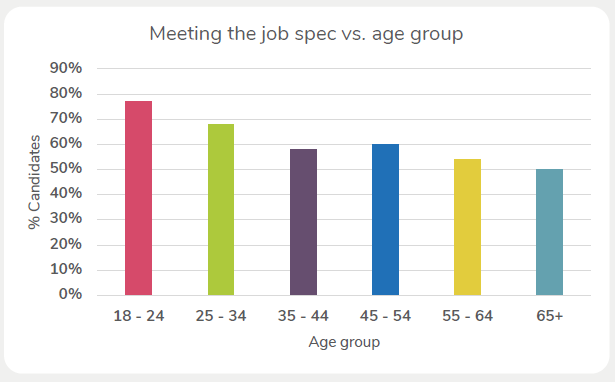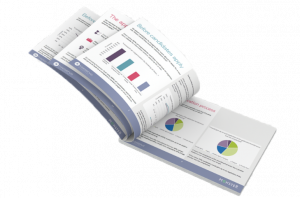New research: Gen Z candidates and the recruitment experience
Today we’re going to be focusing on the experiences of our youngest jobseekers: Gen Z candidates.
Following our recent research into candidate behaviour, we asked what matters to 18-24 year olds during the hiring cycle. From interview formats to company culture, let’s dive in.

The application process
In our research, over half (53%) of all respondents would give up on an application form if it was too complex. Interestingly, Gen Z candidates were far less likely to give up on an application process.
Only 42% would abandon an application if it was too complex, and even fewer (34%) would give up if it was too long. In comparison, our recent deep dive into older candidates showed that applicants aged 55+ years would give up on a form.
So why are our Gen Z candidates less likely to give up? Do younger applicants inherently have more patience?
The reason could be less positive than this. Recent data revealed that youth long-term unemployment has hit a five-year high, with more than 200,000 under 25s out of work for more than six months.[1]
In this challenging context, it could be that younger candidates are prepared to endure complex or lengthy application processes, simply to try and secure a new role.
Confidence in Gen Z candidates
Younger candidates were disproportionately affected by a lack of confidence when applying for roles.
When faced with lengthy job criteria, 58% of all respondents would not apply for a role unless they met all the requirements. However, this figure rises steeply to 77% for those aged 18 – 24.

Takeaway: If you are recruiting or trying to attract younger talent, consider how a lengthy list of ‘essential’ requirements may appear to them. Focus instead on the duties candidates would need to perform if they got the role, and the values and approach you’re seeking from a new hire.
“[Job-seeking] can be stressful, so making the process as easy and welcoming would be beneficial” – Survey respondent
Interview formats
Being digital natives, we might have expected Gen Z candidates to prefer online interviews to face-to-face ones. However, over two-thirds (62%) of our respondents aged 18 – 24 said they favoured an in-person interview experience.
Interestingly, it was respondents in the 35-44 and 45-54 age brackets who were most likely to prefer online interviews over face-to-face. This could be down to familiarity with professional digital tools.
Younger candidates have grown up with digital devices but won’t necessarily have experience in business applications, such as Outlook or video interviewing software. Where possible, provide guidance on how to participate in online interviews. Short how-to videos can be a simple way to communicate this.
Takeaway: Managing expectations and providing help and support with online interviews will help make them more accessible and inclusive for candidates of different ages, experience and digital access.
73% of Gen Z candidates also expect detailed feedback to be provided after an interview, without having to request it. This was bang on average in line with the rest of our respondents across all age groups.
If you have an Applicant Tracking System, make use of automated emails, which can be branded and personalised to candidates. You should be able to trigger these at each stage of a candidate’s journey with you.
“Feedback is essential.” – Survey respondent
Perks, benefits and company culture
On average, the majority of all respondents agreed that staff benefits and perks are important, at 70%. Our Gen Z candidates were no different, with 71% also agreeing with this statement.
Gen Z applicants were also only slightly above the average when it comes to an organisation’s commitment to D&I (75% agreed this was important, compared to an average across all age groups of 73%) and support of the environment (77% vs. 74%).
However, there was a significant difference in terms of how our Gen Z respondents viewed enhanced maternity, paternity and shared parental leave policies. 69% felt this this was important, as opposed to an average of only 48% across all ages. As conversations about work-life balance, parental leave and flexible working continue to increase, it could be that younger candidates are more aware of the significance of enhanced policies than previous generations of jobseekers were.
There was also a marked increase in the importance Gen Z candidates place on an organisation’s charitable support. 62% of our younger respondents agreed or strongly agreed that it was important for a company to make charitable donations, compared to only 50% on average.
Takeaway: Ensure your staff benefits and company values are clearly displayed so candidates can view them.
Where to work post-pandemic
We asked our survey respondents where they ideally wanted to work post-Covid.
80% of candidates aged 18 – 24 wanted to either return to their workplace or to have a hybrid working model. This is up 10% on the average across all ages.
Gen Z candidates were the least likely to want to remain working from home after pandemic restrictions lift. This could be due to the nature of their work, with more younger people working in hospitality, retail and leisure industries where it is less possible to be home-based.
In summary:
- Gen Z candidates have been significantly impacted by unemployment. With roles in short supply, they may be more likely to undertake complex or lengthy application forms. Please don’t make them! Keep applications simple and painless.
- A significant majority (77%) of Gen Z candidates would not apply for a role unless they met all the essential requirements. Younger applicants are disproportionately affected by this compared to other age groups. Keep job specs concise and review whether your essential criteria.
- Over two-thirds of younger candidates still prefer face-to-face interviews compared to online experiences.
- Gen Z candidates place great importance on company ethos, parental leave policies, D&I approach and an organisation’s environmental and charitable support.
 In our new research, Candidate Behaviour: The Big Report, we spoke to a diverse range of candidates. Created in partnership with Monster, we asked jobseekers across the country, of all ages and working in a wide range of sectors, to tell us how they act, think and feel during the hiring process.
In our new research, Candidate Behaviour: The Big Report, we spoke to a diverse range of candidates. Created in partnership with Monster, we asked jobseekers across the country, of all ages and working in a wide range of sectors, to tell us how they act, think and feel during the hiring process.
So if you’re particularly interested in insights on the assessment process, or interested in how male and female candidates differ, download your report today!
[1] https://www.theguardian.com/society/2021/apr/21/youth-unemployment-the-young-workers-hit-hard-by-the-covid-crisis



